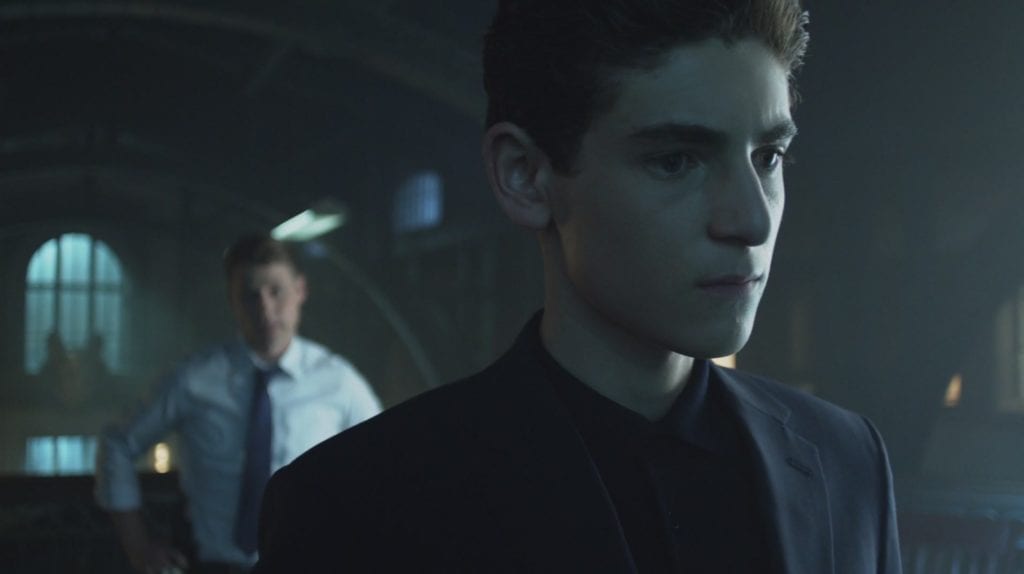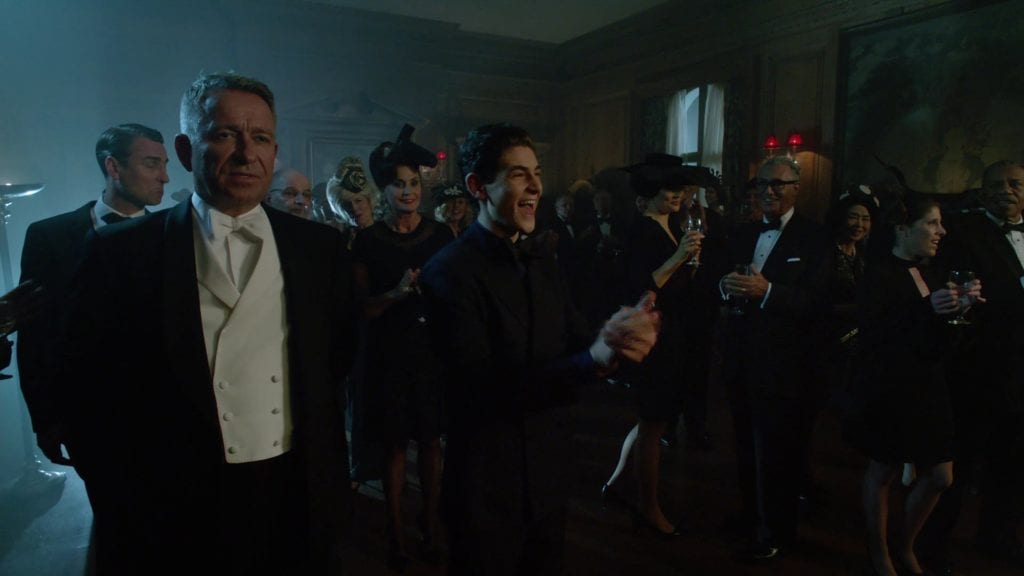When I first read the premise for Gotham, I’ll admit I was apprehensive. About several things. One of the main ones was what kind of role would Bruce Wayne have in a story that’s a prequel to his own origin. Could a twelve-year-old realistically play a significant part in a crime drama series? Would he even be able to play a role beyond bystander? In the time since I’ve been happy to learn my apprehension was for naught.
While James Gordon has been the centre of the show, Bruce was never neglected. His progression from a child lost in the wake of his parents’ death to someone willing to fight the corruption of his city, first hand, has been a long road, three seasons in the making. The time was taken for Bruce to grow, both physically and mentally. The drive for justice that is such a mainstay element of Batman’s legacy has been in Bruce since day one. The story since has allowed it to evolve.
It started with his desire to see his parents’ killer brought to justice. This path forced him to face the darkness that invades every part of life in Gotham. He saw a side of the city he’d been shielded from by his youth, his wealth and his parents. As he learnt more, his desire for justice for his parents grew into the desire to help the city they died trying to save.
Gotham’s third season ended with Bruce saving a family returning home from the theatre from a gunman. It’s a full circle moment for Bruce that encompassed all his experiences until then. His parents’ murder pushed him to look for justice, in his search he learnt more about Gotham and the corruption that affected all of the city, from the poorest areas to Wayne Industries. His fight for justice became more than just vindication for his parents. These were the first steps to him becoming the man who will become Batman.
If Bruce’s arc from season one to three was about him finding the conviction to be Batman, his arc in season 4 has been him gaining the experience he’ll need to be the vigilante hero. This season has been about him learning to use the masks of both Batman and Bruce Wayne.
Batman, the World’s Greatest Detective
Season four starts off with a Bruce who’s the closest to being Batman, as he ever has been. He’s uncovered who was responsible for his parents’ murder. He faced some of the criminals who’ll become his adversaries. He’s started protecting the streets of Gotham as a masked vigilante, even if his mask is more in the way of a ski mask and less full molded cowl. (Although Alfred does eventually make a mask for him that proves the bat ears really are needed to make the whole look work.)
His nightly patrols result in him encountering the crime licences Penguin has implemented. Season four has been sprinkled with moments that wonderfully foreshadows what’s to come when Bruce does truly become the Batman. His scene with Gordon at the start of the season is one the best examples of those. He appears silently to Gordon at his precinct, catching him off guard. He questions him about the licences and when he’s gained the information he needs he vanishes as quietly as he entered. But not before suggesting he and Gordon catch up over a meal soon.

It’s a small moment, but one that speaks volumes of the relationship the two have built up over the series. They started out as something that resembled a mentor and mentee. And though Bruce’s trust in Gordon was at times shaken they’ve grown to be comrades, both fighting the same war. It’s not a far stretch to imagine a similar scene taking place on the roof of the precinct.
His conversation with Gordon also shows off his reasoning skills. If the licences are numbered there must be a list. Find the list, you find a roadmap to the crimes taking place in the city. When he does discover who has the list he appears admits flickering lights and shrouded in shadow. It’s reminiscent of scenes from the theatrical adaptations.
The Birth of the Billionaire Playboy
As gratifying as it seeing Bruce’s skills a fighter and detective grow, the true gem of this season has been watching him use his privileged status to his advantage. Bruce Wayne, the Bruce Wayne known to most of the public is as much a façade as Batman is, if not more so. “There is a time for masks and there is a time for Bruce Wayne.”
Going out as a socialite lets him brush shoulders with the likes of Penguin and the rest of the criminal elite that run Gotham’s underworld. He plays up the image of a teenage boy enticed by the insidious side of Gotham. It’s easy enough to fool others of his true intentions when it seems like everyone with deep pockets in the city has ties to the underworld.
This gives birth to a moment that sealed David Mazouz as my favourite Bruce Wayne (Sorry Conroy and Keaton). His efforts to keep a sacred knife out of Ra’s al Ghul’s hands leads him and Alfred to a black market auction and for the first time, he truly uses Bruce Wayne as a mask. He puts on the role of a, as Alfred puts it, “privileged, somewhat pedantic teenager with deeper pockets than anyone else’s in this city.” And does he ever put on the show.
He’s loud, rambunctious and annoying. Any other city and he might have oversold his performance. But this is Gotham, eccentric happens on the daily. He carelessly throws money away, bidding on everything at the auction to cover his real intentions. It’s nothing short of a good time watching him teasingly raise the highest bid on the knife by a single dollar or cent when going against Barbra Kean. Acting like the brat who doesn’t want to lose. It’s a brilliant moment.

Inexperience Breeds Mistakes
Yet, in spite of all this, he’s still not Batman at this point, and it’s going to take more than him witnessing a bat crashing through a window of the manor for him to be ready to become the dark knight. The greatest difference between Gotham’s Bruce and as Batman as we know him is experience. He doesn’t yet have the years of experience he’ll need to be able to make the right calls in the field. Gotham doesn’t shy away from testing Bruce’s experience.
Ra’s comes after the knife Bruce worked to keep out of his hands. A young boy, Alex, ends up becoming entangled with the conflict. It all comes to a head with James Gordon has a gun trained on Ra’s, Ra’s has Alex with a blade to his neck and Bruce has the knife. James is willing to hand the knife over to save Alex, but Bruce isn’t. He doesn’t know what the knife is capable of and he doesn’t want to risk finding out. James being here at this moment makes it all the more clear how Bruce’s inexperience hinders his judgement. Gordon’s own arc has seen him grappling with just how much a criminal should get away with if it’s for the sake of keeping the greater status quo. But he doesn’t hesitate when Ra’s asks for the knife. He’s not willing to risk Alex’s life calling a bluff. Bruce takes the gamble and he loses.
His anger and pain over Alex’s death leads to him hunting down Ra’s and in a moment of passionate rage killing him. Bruce breaks the one rule he set for himself. The fallout after is disastrous. He turns to drinking and partying to numb himself. Alfred meets him in the morning, hungover or has to hunt him down at whatever party he passed out at.
Alfred tries to reach out to him, first with the fatherly compassion he’s always used with Bruce. When that doesn’t work he tries tough love. But Bruce isn’t having any of it. Ra’s death revealed two things to him. He didn’t regret killing him and it was all meaningless in the end. His parents are still gone. Gotham is still run by the crime lords. The city has always been corrupt and now he doesn’t see how he can change that. Bruce isn’t just playing the billionaire brat anymore. He’s accepted that’s his place in Gotham. It helps him forget the pain of the deaths he’s experienced. It’s numbed the vigour that pushed him this far.
When taken so close to the top, it’s a long way to fall down. Gotham gave us a glimpse of Bruce as Batman and then ripped it away. There’s no doubt he’ll find his motivation once again, but the journey back won’t easy. But that journey will have to wait until Gotham returns for season 4B.

